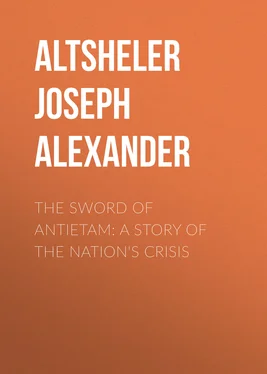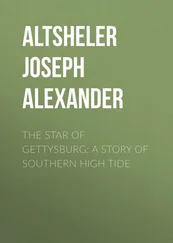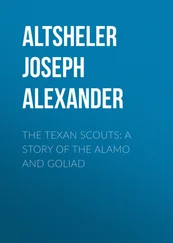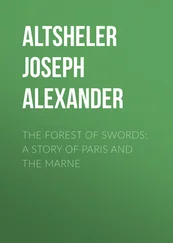Joseph Altsheler - The Sword of Antietam - A Story of the Nation's Crisis
Здесь есть возможность читать онлайн «Joseph Altsheler - The Sword of Antietam - A Story of the Nation's Crisis» — ознакомительный отрывок электронной книги совершенно бесплатно, а после прочтения отрывка купить полную версию. В некоторых случаях можно слушать аудио, скачать через торрент в формате fb2 и присутствует краткое содержание. Издательство: Иностранный паблик, Жанр: foreign_children, foreign_antique, foreign_prose, prose_military, на английском языке. Описание произведения, (предисловие) а так же отзывы посетителей доступны на портале библиотеки ЛибКат.
- Название:The Sword of Antietam: A Story of the Nation's Crisis
- Автор:
- Издательство:Иностранный паблик
- Жанр:
- Год:неизвестен
- ISBN:нет данных
- Рейтинг книги:4 / 5. Голосов: 1
-
Избранное:Добавить в избранное
- Отзывы:
-
Ваша оценка:
- 80
- 1
- 2
- 3
- 4
- 5
The Sword of Antietam: A Story of the Nation's Crisis: краткое содержание, описание и аннотация
Предлагаем к чтению аннотацию, описание, краткое содержание или предисловие (зависит от того, что написал сам автор книги «The Sword of Antietam: A Story of the Nation's Crisis»). Если вы не нашли необходимую информацию о книге — напишите в комментариях, мы постараемся отыскать её.
The Sword of Antietam: A Story of the Nation's Crisis — читать онлайн ознакомительный отрывок
Ниже представлен текст книги, разбитый по страницам. Система сохранения места последней прочитанной страницы, позволяет с удобством читать онлайн бесплатно книгу «The Sword of Antietam: A Story of the Nation's Crisis», без необходимости каждый раз заново искать на чём Вы остановились. Поставьте закладку, и сможете в любой момент перейти на страницу, на которой закончили чтение.
Интервал:
Закладка:
Their own bugles sounded the retreat and they began to retire slowly.
“Do we run again?” exclaimed Pennington, a tear ploughing its way through the smoky grime on his cheek.
“No, we don’t run,” replied Warner calmly, “We’re forced back, and the rebels will claim a victory but we haven’t fought for nothing. Lee and Jackson will never get up in time to attack our army before it’s over the river.”
The regiment began its slow retreat. It had not suffered much, owing to the shelter of the forest, and, full of courage and resolution, it was a formidable support on the flank of the slowly retreating cavalry.
The evening was now at hand. The sun was setting once more over the Virginia hills destined to be scarred so deeply by battle, but attack and defense went on. As night came the thudding of cannon added to the tumult, and then the three boys saw the Rappahannock, a deep and wide stream flowing between high banks crested with timber. Ahead of them Pope’s army was crossing on the bridge and in boats, and masses of infantry supported by heavy batteries had turned to protect the crossing. The Southern vanguard could not assail such a powerful force, and before the night was over the whole Union army passed to the Northern side of the Rappahannock.
Dick felt a mixture of chagrin and satisfaction as he crossed the river, chagrin that this great army should draw back, as McClellan’s had been forced to draw back at the Seven Days, and satisfaction that they were safe for the time being and could prepare for a new start.
But the feeling of exultation soon passed and gave way wholly to chagrin. They were retreating before an army not exceeding their own, in numbers, perhaps less. They had another great force, the Army of the Potomac, which should have been there, and then they could have bade defiance to Lee and Jackson. The North with its great numbers, its fine courage and its splendid patriotism should never be retreating. He felt once more as thousands of others felt that the hand on the reins was neither strong nor sure, and that the great trouble lay there. They ought not to be hiding behind a river. Lee and Jackson did not do it. Dick remembered that grim commander in the West, the silent Grant, and he did not believe he would be retreating.
Long after darkness came the firing continued between skirmishers across the stream, but finally it, too, waned and Dick was permitted to throw himself upon the ground and sleep with the sleeping thousands. Warner and Pennington slept near him and not far away was the brave sergeant. Even he was overpowered by fatigue and he slept like one dead, never stirring.
Dick was awakened next morning by the booming of cannon. He had become so much used to such sounds that he would have slept on had not the crashes been so irregular. He stood up, rubbed his eyes and then looked in the direction whence came the cannonade. He saw from the crest of a hill great numbers of Confederate troops on the other side of the river, the August sun glittering over thousands of bayonets and rifle barrels, and along the somber batteries of great guns. The firing, so far as he could determine, was merely to feel out or annoy the Northern army.
It was a strange sight to Dick, one that is not looked upon often, two great armies gazing across a river at each other, and, sure to meet, sooner or later, in mortal combat. It was thrilling, awe-inspiring, but it made his heart miss a beat or two at the thought of the wounds and death to come, all the more terrible because those who fought together were of the same blood, and the same nation.
Warner and Pennington joined him on the height where he stood, and they saw that in the early hours before dawn the Northern generals had not been idle. The whole army of Pope was massed along the left bank of the river and every high point was crowned with heavy batteries of artillery. There had been a long drought, and at some points the Rappahannock could be forded, but not in the face of such a defence as the North here offered.
Colonel Winchester himself came a moment or two later and joined them as they gazed at the two armies and the river between. Both he and the boys used their glasses and they distinctly saw the Southern masses.
“Will they try to cross, sir?” asked Dick of the colonel.
“I don’t think so, but if they do we ought to beat them back. Meanwhile, Dick, my boy, every day’s delay is a fresh card in our hand. McClellan is landing his army at Aquia Creek, whence it can march in two days to a junction with us, when we would become overwhelming and irresistible. But I wish it didn’t take so long to disembark an army!”
The note of anxiety in his voice did not escape Dick. “You wish then to be sure of the junction between our two armies before Lee and Jackson strike?”
“Yes, Dick. That is what is on my mind. The retreat of this army, although it may have caused us chagrin, was most opportune. It gave us two chances, when we had but one before. But, Dick, I’m afraid. I wouldn’t say this to anybody but you and you must not repeat me. I wish I could divine what is in the mind of those two men, Lee and Jackson. They surely have a plan of some kind, but what is it?”
“Have we any definite news from the other side, sir?”
“Shepard came in this morning. But little ever escapes him, and he says that the whole Southern army is up. All their best leaders are there. Lee and Jackson and Longstreet and the Hills and Early and Lawton and the others. He says that they are all flushed with confidence in their own courage and fighting powers and the ability of their leaders. Oh, if only the Army of the Potomac would come! If we could only stave off battle long enough for it to reach us!”
“Don’t you think we could do it, sir? Couldn’t General Pope retreat on Washington then, and, as they continued to follow us, we could turn and spring on them with both armies.”
But Colonel Winchester shook his head.
“It would never do,” he said. “All Europe, eager to see the Union split, would then help the Confederacy in every possible manner. The old monarchies would say that despite our superior numbers we’re not able to maintain ourselves outside the defenses of Washington. And these things would injure us in ways that we cannot afford. Remember, Dick, my boy, that this republic is the hope of the world, and that we must save it.”
“It will be done, sir,” said Dick, almost in the tone of a young prophet. “I know the spirit of the men. No matter how many defeats are inflicted upon us by our own brethren we’ll triumph in the end.”
“It’s my own feeling, Dick. It cannot, it must not be any other way!”
Dick remained upborne by a confidence in the future rather than in the present, and throughout the morning he remained with his comrades, under arms, but doing little, save to hear the fitful firing which ran along a front of several miles. But later in the day a heavy crash came from a ford further up the stream.
Under cover of a great artillery fire Stuart’s cavalry dashed into the ford, and drove off the infantry and a battery posted to defend it. Then they triumphantly placed heavy lines of pickets about the ford on the Union side.
It was more than the Union lads could stand. A heavy mass of infantry, Colonel Winchester’s regiment in the very front of it, marched forward to drive back these impertinent horsemen. They charged with so much impetuosity that Stuart’s cavalry abandoned such dangerous ground. All the pickets were drawn in and they retreated in haste across the stream, the water foaming up in spurts about them beneath the pursuing bullets.
Then came a silence and a great looking back and forth. The threatening armies stared at each other across the water, but throughout the afternoon they lay idle. The pitiless August sun burned on and the dust that had been trodden up by the scores of thousands hung in clouds low, but almost motionless.
Читать дальшеИнтервал:
Закладка:
Похожие книги на «The Sword of Antietam: A Story of the Nation's Crisis»
Представляем Вашему вниманию похожие книги на «The Sword of Antietam: A Story of the Nation's Crisis» списком для выбора. Мы отобрали схожую по названию и смыслу литературу в надежде предоставить читателям больше вариантов отыскать новые, интересные, ещё непрочитанные произведения.
Обсуждение, отзывы о книге «The Sword of Antietam: A Story of the Nation's Crisis» и просто собственные мнения читателей. Оставьте ваши комментарии, напишите, что Вы думаете о произведении, его смысле или главных героях. Укажите что конкретно понравилось, а что нет, и почему Вы так считаете.












